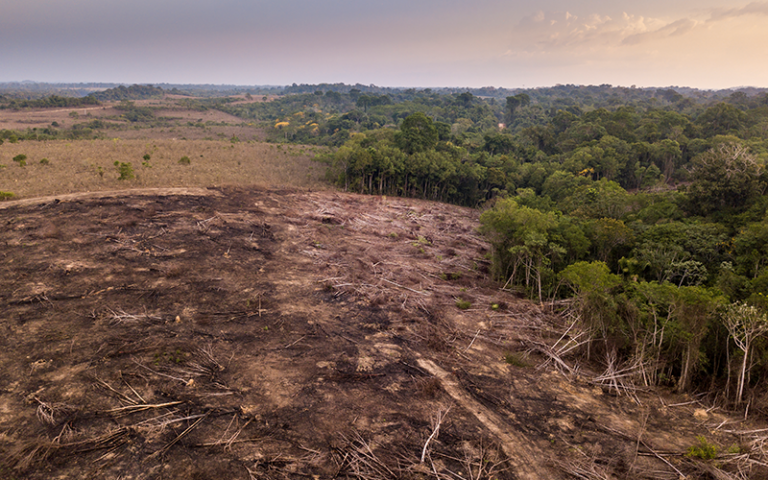Understanding disease spill-over from wildlife to improve public health
UCL and Institute of Zoology researchers have identified what drives transfer of diseases from wildlife to people, predicting emerging disease hotspots and informing disease management globally.

20 April 2022
Animal-borne (zoonotic) diseases are a major global human health and economic burden. But in many cases, little is known about the underlying reasons for spill-overs into humans, severely hindering our ability to prevent and manage future outbreaks.
A team led by Professor Kate Jones (UCL Division of Biosciences) has shaped global zoonotic disease research funding priorities, informed international and UN policy, and underpinned public health responses to disease outbreaks across the world and in the UK.
In 2000, IoZ researchers developed a new model to explain the links between ecology and human health. They identified that the emergence of zoonotic diseases in humans - such as Ebola and HIV/AIDS - was driven by human activities, such as changes in hunting practices, encroachment into wildlife habitats and a growing international trade in wildlife.
This provided a scientific rationale for what is now known as ‘One Health’ – an approach to designing and implementing programmes, policies, legislation and research in which multiple sectors communicate and work together to achieve better public health outcomes.
Developing a holistic approach
Subsequent research demonstrated that the rate of disease emergence was increasing, that the majority of human infectious diseases were from wildlife, and that areas of high biodiversity and increased human population densities correlated with past zoonotic diseases.
It demonstrated that infectious disease risk is increased by biodiversity loss. It also highlighted that global resources to counter disease emergence are currently focussed on countries where the next important emerging infectious disease is least likely to originate.
In 2012, a joint IoZ-UCL project developed a framework to put the ‘One Health’ approach into operation and inform appropriate, holistic responses to zoonotic disease spill-overs and to manage and mitigate the risk of emerging infectious diseases.
UCL and IoZ research was used as the basis for targeting the US Government’s international aid to countries at high risk of emerging diseases. From 2008 to 2019, approximately USD1.5 billion was spent through the Emerging Pandemic Threats programme. It has also been used to prioritise spending at the UK’s Department for International Development and the Intergovernmental Science-Policy Platform on Biodiversity and Ecosystem Services.
Informing global responses to outbreaks
This work has also informed international and national policy priorities and public health responses to disease outbreaks. For example, UCL and IoZ evidence was used for the United Nations Environment Programme (UNEP)’s rapid assessment report ‘Preventing the next Pandemic’ (2002). This led to UNEP joining an alliance with the World Organisation for Animal Health, the Food and Agriculture Organisation, and the World Health Organisation to strengthen the environmental dimension of One Health global efforts.
Evidence on the impact of ecosystem degradation on zoonotic risk was included in The Dasgupta Review, commissioned by the UK Treasury, setting out how nature should be accounted for in economics and decision making. This has informed policy discussions at the Convention on Biological Diversity COP 15, United Nations Framework Convention on Climate Change COP 26, and the G7 meeting in 2021.
The research team also included Professor Andrew Cunningham and Dr David Redding of the Zoological Society of London.
Research synopsis
Understanding disease spill-over from wildlife to improve public health
Animal-borne (zoonotic) diseases are a major global human health and economic burden. But in many cases, little is known about the underlying reasons for spill-overs into humans, severely hindering our ability to prevent and manage future outbreaks. UCL and Institute of Zoology (IoZ) researchers have identified and quantified what drives transfer of diseases from wildlife to people, predicting emerging disease hotspots, and developing a single framework to inform disease management. Their findings have shaped global zoonotic disease research funding priorities, informed international and UN policy, and underpinned public health responses to disease outbreaks across the world and in the UK.
Links
- Professor Kate Jones’ academic profile
- Professor Andrew Cunningham’s academic profile
- Dr David Redding’s academic profile
- UCL Division of Biosciences
- UCL Faculty of Life Sciences
- School of Life & Medical Sciences
- UCL Life Sciences REF 2021
Image
- Image credit: iStock / Paralaxis
 Close
Close

